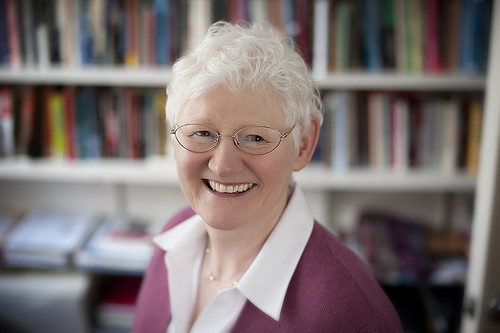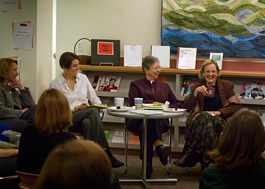As an economics graduate student in the early ’80s, Ulla Grapard was encouraged to pursue a subject outside the field to round out her studies. But when she mentioned women’s studies as a topic, her professor said, “What?” and then, “No.”
But she was doing a ton of reading about women’s issues, attending talks and lectures, and would not let the idea go because she saw the connection, the thread.
“It seemed to me that gender was profoundly important when you started looking at economics,” she said. “But it was as if the economic age that I grew up in was always presented as completely without gender.”
The times changed, and Grapard contributed to that change as a founding member of the International Association for Feminist Economics and in her role as associate professor of economics and women’s studies at Colgate.
 |
| Ulla Grapard teaches her Gender in the Economy course in the Women’s Studies Center. (Photo by Andy Daddio) |
One of her early research interests was the unpaid sector of the economy.
“We all come into this world as babies who need care and attention. And that labor has by and large been performed by women, and been performed by women without pay. So there is this whole unpaid sector, a whole activity that is productive activity, that has been disregarded by economists for a long, long, time, and that is profoundly gendered.”
Feminist economists now are examining the role women play in the success of male CEOs whose jobs require a spouse who can provide child care and run a household while the executive works 70 to 80 hours a week.
In some recent divorce cases, women have argued that they are partners and significant contributors to the husband’s success, and should be compensated that way.
 |
| The Women’s Studies Center hosts a wide variety of discussions and events involving faculty, students, and alumni. (Photo by Brooke Ousterhout ’10) |
Grapard regularly examines such issues in her Gender in the Economy course. She teaches the course at the university’s Women’s Studies Center, where she has maintained a second office in her role as director of the Women’s Studies Program.
She has been director the past three years, and is encouraged by the increasing role the center has played in the advancement of the academic program.
She explained that many colleges have a women’s studies program or department that is separate from the women’s center.
“The nice thing about Colgate, and a real strength, is that we have an academic component that’s matched up in the center with all of its programming and activities.”
Students, mostly females but by no means all, and some who are women’s studies concentrators and some who aren’t, now use the center as a place to hang out.
“We have a regular group of students who use this as their space for studying because we have a library and computers. They come here to talk. They bring their food and they eat because it’s a pleasant area. It’s cozy. Many of our students will talk about the center as their home.”
It is a home she has helped improve and hopes will continue to grow — for all students.